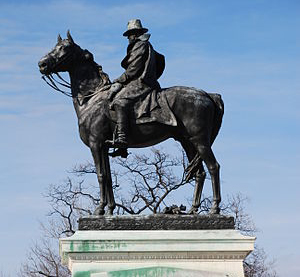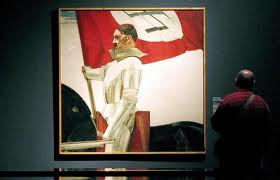Look out kid
You’re gonna get hit
But users, cheaters
Six-time losers
Hang around the theaters
Girl by the whirlpool
Lookin’ for a new fool
Don’t follow leaders
Watch the parkin’ meters. — Dylan
So Bobo is complaining that we just don’t worship heroes and follow leaders the way we used to. He spends about a third of the column complaining that Washington monuments are so much less heroic than they used to be. The statues of Jefferson and Lincoln are powerful but humanized, Bobo says. More recent ones, such as to World War II or FDR, are mostly duds.”That’s because they say nothing about just authority,” Bobo says.
I agree that the WWII and FDR monuments lack the visual and emotional impact of Jefferson and Lincoln, but I think that’s mostly because they are more installations than monuments. I’ll come back to this in a minute. Bobo goes on —
I don’t know if America has a leadership problem; it certainly has a followership problem. Vast majorities of Americans don’t trust their institutions. That’s not mostly because our institutions perform much worse than they did in 1925 and 1955, when they were widely trusted. It’s mostly because more people are cynical and like to pretend that they are better than everything else around them. Vanity has more to do with rising distrust than anything else.
Metrosexual Black AbeJ points out,
Bad choice of years. In 1925, the country was in a (albeit soon-to-end) boom, in 1955 it was in the middle of the greatest 25-year-period in human economic history. Now, by contrast, we are at the end of a five-year stretch during which the average American family has seen its total assets drop in value by 40%, which means there has been no growth (zero) in the wealth of the average American family over the past 20 years. And then throw in a disastrous war that elites almost uniformly supported.
Those of us at least old enough to remember Howdy Doody know that a lot changed in the 1960s and never went back to the way it was before. The Greatest Generation went through the New Deal and World War II and trusted the government to know what it was doing. The Boomer generation was raised to believe America Is the Best, Smartest, Holiest Nation That Ever Was and were betrayed by Vietnam.
The old adversary culture of the intellectuals has turned into a mass adversarial cynicism. The common assumption is that elites are always hiding something. Public servants are in it for themselves. Those people at the top are nowhere near as smart or as wonderful as pure and all-knowing Me.
You end up with movements like Occupy Wall Street and the Tea Parties that try to dispense with authority altogether. They reject hierarchies and leaders because they don’t believe in the concepts. The whole world should be like the Internet — a disbursed semianarchy in which authority is suspect and each individual is king.
Oh, please; the baggers are followers par excellence. They are perfect examples of the right-wing authoritarian model. The OWSers are something else entirely, discussed in the last post.
I think mass media have made leaders a lot more familiar than they used to be. Consider that during the Lincoln Administration few Americans ever heard Lincoln’s voice. It’s been recorded that he had a high-pitched voice and a dreadful backwoods accent. Most Americans only saw his homely, solemn face in engravings — I don’t think still photos could be printed yet — and read his eloquent speeches in newspapers. These days we get them walking and talking, gaffes and all, in our living rooms. Some leaders have the stage presence to make this work for them; most don’t.
I’m thinking also of a book titled The Mask of Command by John Keenan. It is more about military than political leaders, but he points out that styles of leadership have changed drastically through recorded history. He does this by illustrating four leaders — Alexander the Great, the Duke of Wellington, Ulysses S Grant, and Adolf Hitlet. A mixed bag. He showed how military leadership evolved from Alexander, wearing flashy armor and charging into battle on a big, white horse, to Grant, who set the style for the modern professional military.
Speaking of monuments, all over Washington there are equestrian statues of Civil War generals brandishing swords while mounted on prancing or rearing horses. And then there’s Grant —

The sculptor, Henry Merwin Schrady, surrounded Grant with a frantic cavalry charge and artillery, but even in the 19th century it would have been absurd to portray Grant as flashy. Alexander the Great was finally, utterly, dead.
But then we get to Hitler —

In the modern era, portraying leaders as larger-than-life heroes is the stuff of totalitarianism. Yet this is what Bobo yearns for. He goes on —
Maybe before we can build great monuments to leaders we have to relearn the art of following. Democratic followership is also built on a series of paradoxes: that we are all created equal but that we also elevate those who are extraordinary; that we choose our leaders but also have to defer to them and trust their discretion; that we’re proud individuals but only really thrive as a group, organized and led by just authority.
I’m saying that if Bobo like heroic monuments I believe there are a lot of them in China, of Chairman Mao.


